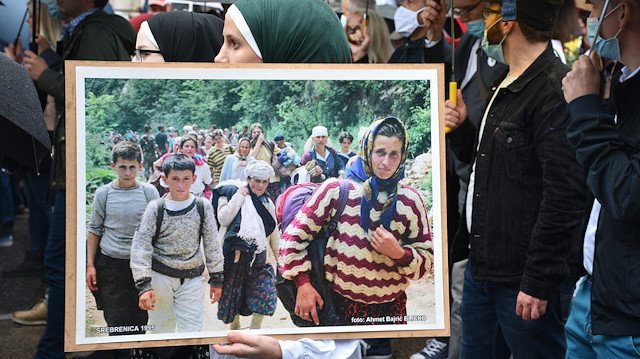
Int'l community should take more responsibility on transgenerational trauma of Srebrenica genocide, says expert
The most important thing to receive recognition and justice for Srebrenica is to educate people about the genocide, and Bosnian history in general, according to a Balkans expert.
On July 11, 1995, one of the world's most horrific genocides took place in the heart of Europe.
As the world remembered Srebrenica genocide on its 25th anniversary on July 11, scholars and genocide survivors discussed what is to be done this year to help survivors find justice.
- Relevant education on genocide is key
Bosnian Muslims are still burying bodies that are uncovered from mass graves, and they still await justice.
The most significant thing to be done is educating people about the genocide in Srebrenica and in Bosnia and Herzegovina in general, Ermin Sinanovic, the executive director at the Center for Islam in the Contemporary World at Shenandoah University in Virginia, US, also a Bosnian-American scholar, told Anadolu Agency.
"The work that is done in Srebrenica Memorial Center is absolutely crucial and they should be supported in every way. The International Criminal Tribunal for the former Yugoslavia [ICTY] has a wealth of primary documents too.
"In addition, it is important to have the truth about the genocide in Srebrenica taught in schools and in institutions of higher education. Lobbying efforts should be focused on the governments to support resolutions that speak truth about the genocide, as well as to criminalize genocide denial," Sinanovic said.
NGOs active in Bosnia in the fields of education, reconciliation, trauma counseling, and other humanitarian work should be supported financially and logistically, he added.
There is also need for good fiction books, novels, plays, and movies about the genocide, and the narrative should be kept alive as well.
- Bosnian genocide gets some recognition, but still work to do
This year, we have seen major international institutions and world governments, including the current and former government leaders, participating in the commemoration of the 25th anniversary of the genocide in Srebrenica.
"In the media outlets, story of Srebrenica is recreated this year. Many of these had been written by the younger generations of Bosnians, some of whom are genocide survivors. That is definitely a positive development.
"On the other hand, there are many who deny the genocide took place. These include Serbian politicians in both Serbia and Bosnia, leftist politicians, and intellectuals/activists like Noam Chomsky, academicians and intellectuals like the Nobel Prize winner for Literature Peter Handke, right-wing activists. Overall, there is a good awareness about the genocide but the work must be continuous," according to the expert.
- Serbian gov't should be held accountable
There should be laws to prosecute those who deny the genocide, and this is about preventing future genocides from happening, Sinanovic said.
Current deniers need to be prosecuted. There should be "naming and shaming" for them, he added.
"The international community needs to procure an official and a sincere recognition and apology from the Serbian government and from the Bosnian Serbs. The Serbs need their Willy Brandt moment, named after a former West German chancellor who, in 1970, knelt in front of a memorial for the Jewish Uprising in 1943," the expert also said.
- Right terminology needed in talking about Srebrenica
For Sinanovic, what happened in Srebrenica was a genocide, an aggression on Bosnia by neighboring countries, it is not a civil war as many outlets tend to describe it.
"Yes, Bosnian Serbs participated in that war, which gives it a civil war dimension, but we should not forget that all of this was orchestrated from Belgrade, and that Serbia [then-part of former Yugoslavia] had many Bosnian Serb officers on its payroll. This was happening when Bosnia and Herzegovina became an independent country and a member of the UN," he explained.
The expert believes that everyone should at least read one book on Srebrenica and the war in Bosnia and Herzegovina.
David Rohde's Endgame and Hasan Nuhanovic's The Last Refuge -- with its author a genocide survivor -- would be a good beginning for those who would like to learn more on the war and the genocide.
- Trauma among families of survivors
Survivors of the genocide have many traumas, which will transform to be transgenerational traumas, according to the expert.
"One of the biggest pains and struggles is the fact that there are still bodies being uncovered, identified and buried," Sinanovic said.
Another challenge is the constant genocide denial and provocations by some of their Serb neighbors. Those who have returned to Srebrenica and surrounding towns and villages still do that and add to the survivors' pain, he noted, adding that the economic situation in that part of Bosnia is not good.
"More investments into sustainable development, like farming and animal rearing, are needed.
"This could and should be an international effort, to facilitate a dignified life for the genocide survivors and their families, and to make sure that recovery and reconciliation happen in Srebrenica, and in Bosnia and Herzegovina," the expert concluded.
- Genocide
In the early 1990s, Srebrenica was besieged by Serb forces who were trying to wrest territory from Bosnian Muslims and Croats to form their own state.
The Dutch troops failed to act as Serb forces occupied the area, killing about 2,000 men and boys on July 11 alone. Some 15,000 Srebrenica people fled into the surrounding mountains, but Serb troops hunted down and killed 6,000 of them in the forests.
More than 8,000 Bosnian Muslim men and boys were killed after Bosnian Serb forces attacked the UN "safe area" of Srebrenica in July 1995, despite the presence of Dutch troops tasked with acting as international peacekeepers.


